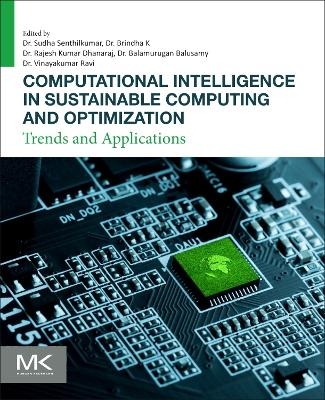
Computational Intelligence in Sustainable Computing and Optimization
Morgan Kaufmann Publishers In (Verlag)
978-0-443-23724-9 (ISBN)
Computational intelligence in the field of sustainable computing combines computer science and engineering in applications ranging from Internet of Things (IoT), information security systems, smart storage, cloud computing, intelligent transport management, cognitive and bio-inspired computing, and management science. In addition, data intelligence techniques play a critical role in sustainable computing. Recent advances in data management, data modeling, data analysis, and artificial intelligence are finding applications in energy networks and thus making our environment more sustainable.
Dr. Balamurugan Balusamy is currently working as an Associate Dean Student in Shiv Nadar Institution of Eminence, Delhi-NCR. He is part of the Top 2% Scientists Worldwide 2023 by Stanford University in the area of Data Science/AI/ML. He is also an Adjunct Professor, Department of Computer Science and Information Engineering, Taylor University, Malaysia. His contributions focus on engineering education, block chain, and data sciences. Dr. Vinayakumar Ravi is an Assistant Research Professor at the Center for Artificial Intelligence, Prince Mohammad Bin Fahd University, Khobar, Saudi Arabia. Dr. Ravi has been a Postdoctoral Research Fellow developing and implementing novel computational and machine learning algorithms and applications for big data integration and data mining with Cincinnati Children's Hospital Medical Center, Cincinnati, USA. He received his Ph.D. in Computer Science from Amrita School of Engineering, Coimbatore, India. His current research interests include applications of data mining, Artificial Intelligence, machine learning and, deep learning for biomedical informatics, cyber security, image processing, and natural language processing. Dr. Ravi is editor of Efficient Data Handling for Massive Internet of Medical Things: Healthcare Data Analytics, Springer. Dr. Ravi is an editorial board member for Journal of the Institute of Electronics and Computer (JIEC), International Journal of Digital Crime and Forensics (IJDCF), and he has organized a shared task force on detecting malicious domain names (DMD 2018) as part of SSCC'18 and ICACCI'18. Dr. Rajesh Kumar Dhanaraj is a professor at the Symbiosis International (Deemed University) in Pune, India. His research and publication interests include cyber-physical systems, wireless sensor networks, and cloud computing. He is a senior member of the Institute of Electrical and Electronics Engineers (IEEE), a member of the Computer Science Teacher Association (CSTA) and member of the International Association of Engineers (IAENG). He is an expert advisory panel member of Texas Instruments Inc. (USA), and an associate editor of International Journal of Pervasive Computing and Communications (Emerald Publishing). Dr. Sudha Senthilkumar is an Associate Professor in the School of Computer Science and Engineering at Vellore Institute of Technology. She received her PhD degree in the School of Information Technology and Engineering from VIT University, Vellore. Her current research interests include cryptography, network security, Big Data, Blockchain technologies, machine learning, deep learning, and remote user authentication using smart cards. Dr. Brindha K is an Associate Professor in the School of Information Technology and Engineering at Vellore Institute of Technology. She received her Ph.D. from VIT, ME in Computer Science and Engineering from Sathyabama University. She has received the active researcher award from VIT for the past twelve years, and is one of the reviewers in the JVLC Elsevier Journal. She is a life member of the Computer Society of India. Her research interests include deep learning, machine learning, cryptography, network security, Cloud computing, and blockchain.
Journey of Computational intelligence in sustainable computing and optimization techniques: An introduction
Designing computational intelligence techniques based smart framework for Sustainable Computing
Multiple Parameter Optimization Methods Based on Computational Intelligence Techniques in Context of Sustainable Computing
IoT based vulnerability assessment for sustainable computing: threats, current solutions, and open challenges
Amalgamation of optimization techniques in big data analytics through granular computing: A roadmap to smart industry framework
Computational intelligence for data analysis in pattern recognition and Biomedical imaging
A block chain and artificial intelligence enabled smart IoT framework for the development of sustainable city
Computational intelligence-based heuristic approach for maximizing energy efficiency in Sustainable Transportation and Mobility
Computational Intelligence for sustainable computing in Health Care informatics
Computational Intelligence for sustainable computing in traditional medical system Ayurveda
Computational intelligence approach for anomaly detection and prediction in health care information
Artificial Intelligence based Computational intelligence solution for robotics automation
Developing Green Computing Awareness based on optimization techniques for Environmental Sustainability
Bio-inspired meta-heuristic algorithm for solving engineering optimization problems based on computational intelligence
Secure sharing of health records stored in cloud using cryptographic secret sharing schemes through computational intelligence: A review
Private Blockchain-based Encryption Framework Using Computational Intelligence Approach
| Erscheinungsdatum | 02.10.2024 |
|---|---|
| Verlagsort | San Francisco |
| Sprache | englisch |
| Maße | 191 x 235 mm |
| Gewicht | 450 g |
| Themenwelt | Informatik ► Theorie / Studium ► Künstliche Intelligenz / Robotik |
| Mathematik / Informatik ► Mathematik ► Angewandte Mathematik | |
| Mathematik / Informatik ► Mathematik ► Finanz- / Wirtschaftsmathematik | |
| ISBN-10 | 0-443-23724-7 / 0443237247 |
| ISBN-13 | 978-0-443-23724-9 / 9780443237249 |
| Zustand | Neuware |
| Haben Sie eine Frage zum Produkt? |
aus dem Bereich


